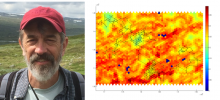Anthropogenic disturbance and population viability of woodland caribou

john m. fryxell
Department of Integrative Biology, University of Guelph, Guelph, Canada
Link to seminar: https://umontpellier-fr.zoom.us/webinar/register/WN_bXUUpapNQr-ow4K6mRWb5Q
This presentation summarizes a broad collaborative project in Ontario to test whether declining food availability or apparent competition due to anthropogenic landscape change were the most likely cause of population collapse of woodland caribou in boreal forests of northern Canada. A team of >10 scientists compared landscape features, food abundance, moose abundance, wolf abundance, movement patterns, and demography of caribou in an uncut pristine boreal forest landscape vs. a landscape that had experienced typical levels of forest harvest. A spatially-explicit agent-based model parameterized from these empirical studies accurately predicted observed landscape differences in caribou survival and population growth and was used to explore potential management options. Linkage of field-based studies of wildlife behavior and ecology with state-of-the-art computer modeling provides a useful approach for identifying potentially useful solutions to wicked conservation problems.
Fryxell et al (2020) Journal of Wildlife Management 84(4):636-650, DOI: 10.1002/jwmg.21829
Watch previous seminars on our YouTube channel: https://www.youtube.com/channel/UCrX4IsZ8WIFcDa0ZmC7rcQg
Olivier Gimenez (CEFE) olivier.gimenez@cefe.cnrs.fr


